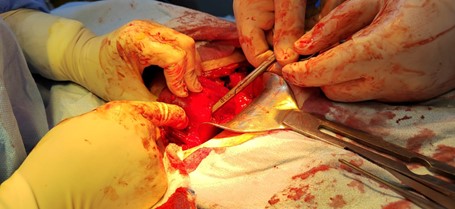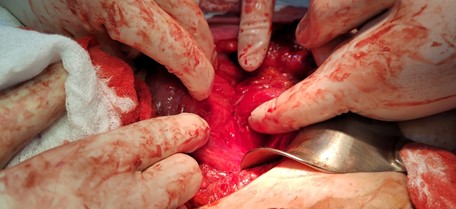Case history:
A 30-year-old woman came to the gynecology clinic at the Specialized Surgical Hospital in Idlib City, which is supported by the Syrian Association of Expatriate Physicians (SEMA), with a story of continuous (discharge) fluid passing through the vagina for 10 years. The patient recalled that she had previously seen several gynecologists and urologists but with no improvement. The patient also states that she had undergone three cesarean sections previously and that the complaint began after the last cesarean section.
Diagnostic Procedures, and Management:
The patient was accepted for the study under the supervision of Dr. Mahmoud Al-Bawab, Chairman of the Scientific Council of Obstetrics and Gynecology, where Methylene blue was injected into the bladder and dye was observed from the cervix, so a diagnosis of vesicouterine fistula resulting from the last cesarean.
The patient was discharged with the recommendation to keep the triple urinary catheter in the bladder for 3 weeks. The patient came for a follow-up visit to the hospital clinic, the condition was good, and the urinary catheter was removed.
Follow-up:
The patient was discharged with the recommendation to keep the triple urinary catheter in the bladder for 3 weeks. The patient came for a follow-up visit to the hospital clinic, the condition was good, and the urinary catheter was removed.


Discussion:
Fistula is defined as an abnormal connection between the urinary system (bladder, ureters, urethra) and the reproductive system (uterus, cervix, vagina).
Classification: Fistula is classified according to anatomical connection into fistula:
- Vaginal ureters – cervical ureters – uterine ureters
- Vaginal bladder – cervical bladder – uterine bladder
- Vaginal urethra – cervical urethra – uterine urethra
Common causes of urogenital fistulas
- Obstetric trauma and pelvic surgery
- 2. 70% of urogenital fistulas are caused by labor abnormalities during normal delivery or cesarean section complications
- Common symptoms: Unexplained urinary leakage through the vagina after recent surgery depending on the size and location of the fistula.
Recommendation: Any patient with transvaginal urinary leakage after surgery should be thoroughly examined to rule out fistula
- Fistulas may appear days or weeks after surgery and sometimes the symptoms remain latent and appear several years later.

